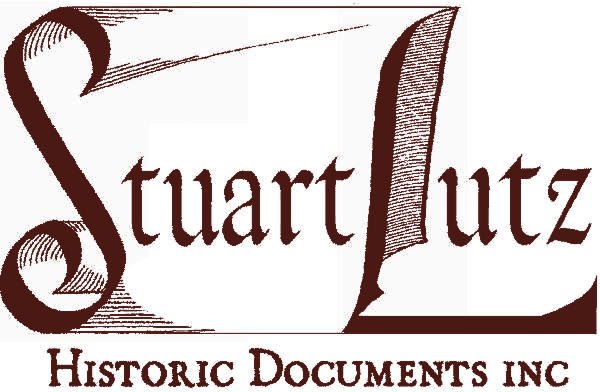| |
 ARTHUR GORMAN ARTHUR GORMAN |
|
|
|
|
| |
Price: $300.00 |
Stock# 6363 |
| |
ARTHUR GORMAN, THE PROXY FOR PRESIDENT ANDREW JOHNSON, ACKNOWLEDGES RECEIPT OF THE HOUSE & SENATE DOCUMENTS FOR THE RECENT CONGRESSIONAL SESSIONS
ARTHUR GORMAN (1839-1906). Gorman was a politician from Maryland, serving as an United States Senator from the state, as well as the Speaker of the Maryland House of Delegates. He was also instrumental in the development of professional baseball in Washington, DC.
DS. 1pg. 8” x 6”. June 13, 1866. No place [presumably Washington]. A document signed “A P Gorman” on behalf of President Andrew Johnson. The document states “Recd of J.W. Forney Secy of the Senate 2 bags containing the Senate & House Documents for the 1st & 2d Sessions of the 36 Congress also the Senate & House Documents for the 37th Cong 1, 2 3d Sessions A P Gorman for Andrew Johnson”. John W. Forney was secretary of the United States Senate from 1861 to 1868. The document is on lined paper and is in fine condition. |
6363
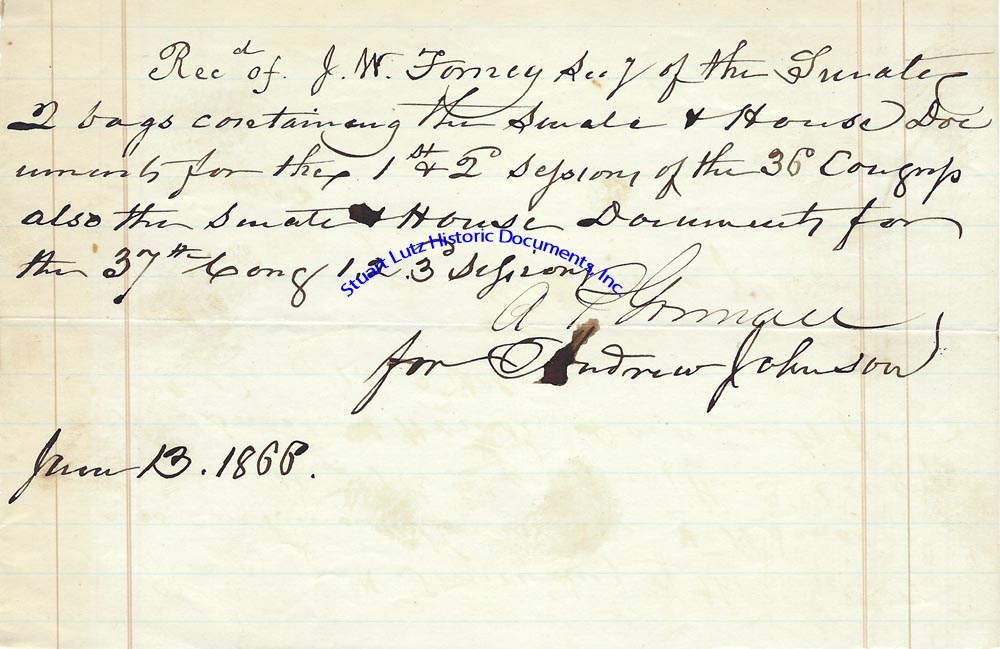
|
|
| |
| |
 ULYSSES S. GRANT ULYSSES S. GRANT |
|
|
|
|
| |
Price: $600.00 |
Stock# 5677 |
| |
AN ATTRACTIVE COPY OF THE PERSONAL MEMOIRS OF U.S. GRANT
ULYSSES S. GRANT (1822-1885). Grant was the Eighteenth President and the head of the Union Army during the Civil War.
A two volume first edition of Personal Memoirs of U.S. Grant. They are bound in green cloth and gilt stamped. The boards have minor wear and the corners are bumped. There are fold outs of Grant facsimile letters. The internal pages have slight foxing but are in fine condition. |
5677
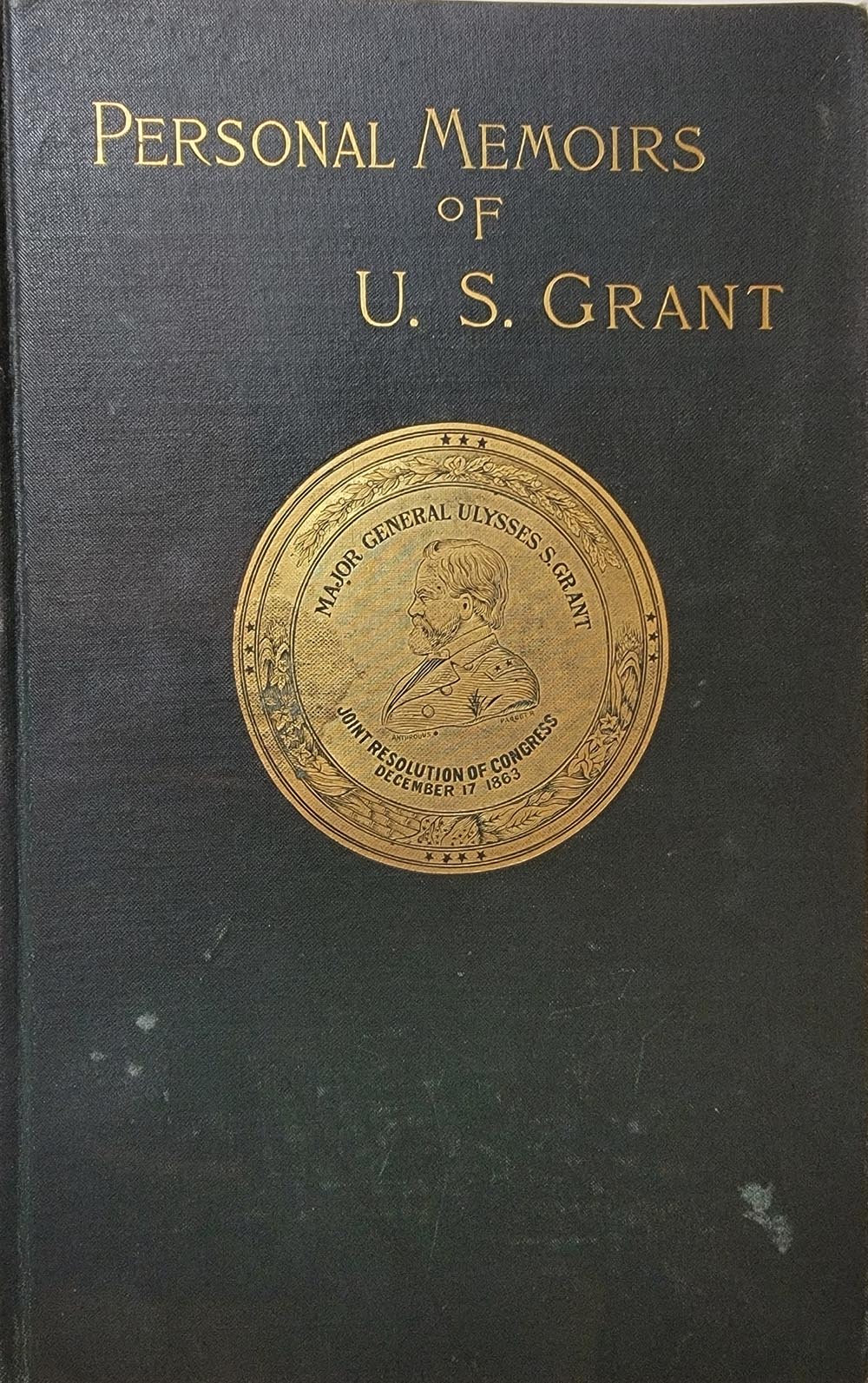
|
|
| |
| |
 (ULYSSES S. GRANT) (ULYSSES S. GRANT) |
|
|
|
|
| |
Price: $250.00 |
Stock# 2665 |
| |
NOT LONG AFTER GENERAL GRANT’S DEATH, NEW YORK VETERANS WANT TO HOLD “MEMORIAL SERVICES IN HONOR OF OUR LATE COMPANION AND COMMANDER GENERAL U.S. GRANT, U.S.A.”
ULYSSES S. GRANT (1822-1885). Grant was the Eighteenth President and the head of the Union armies during the Civil War.
WILLIAM CHURCH. Colonel Church was the Editor of the U.S. Army and Navy Journal.
D. 2pg. 8” x 10”. October 8, 1885. New York. A document regarding a memorial service for President Grant not long after he died. It is on “Military Order of the Loyal Legion of the United States” letterhead and reads: “At a stated meeting of the Commandery held on the 7th inst, the following Resolution was adopted and Committee appointed: ‘Resolved, that a Committee of five be appointed by the Commander to take into consideration the subject of holding memorial services in honor of our late Companion and Commander General U.S. Grant, U.S.A., and that said Committee have power to arrange for such services and to invite members of other Commanderies to participate therein.” The document then lists the five members of the committee; Church, General M.T. McMahon, General Israel Vogdes, Commander Edward Hooker and Colonel H.C. King. The document has light soiling and smudges, and is in fine condition. |
2665
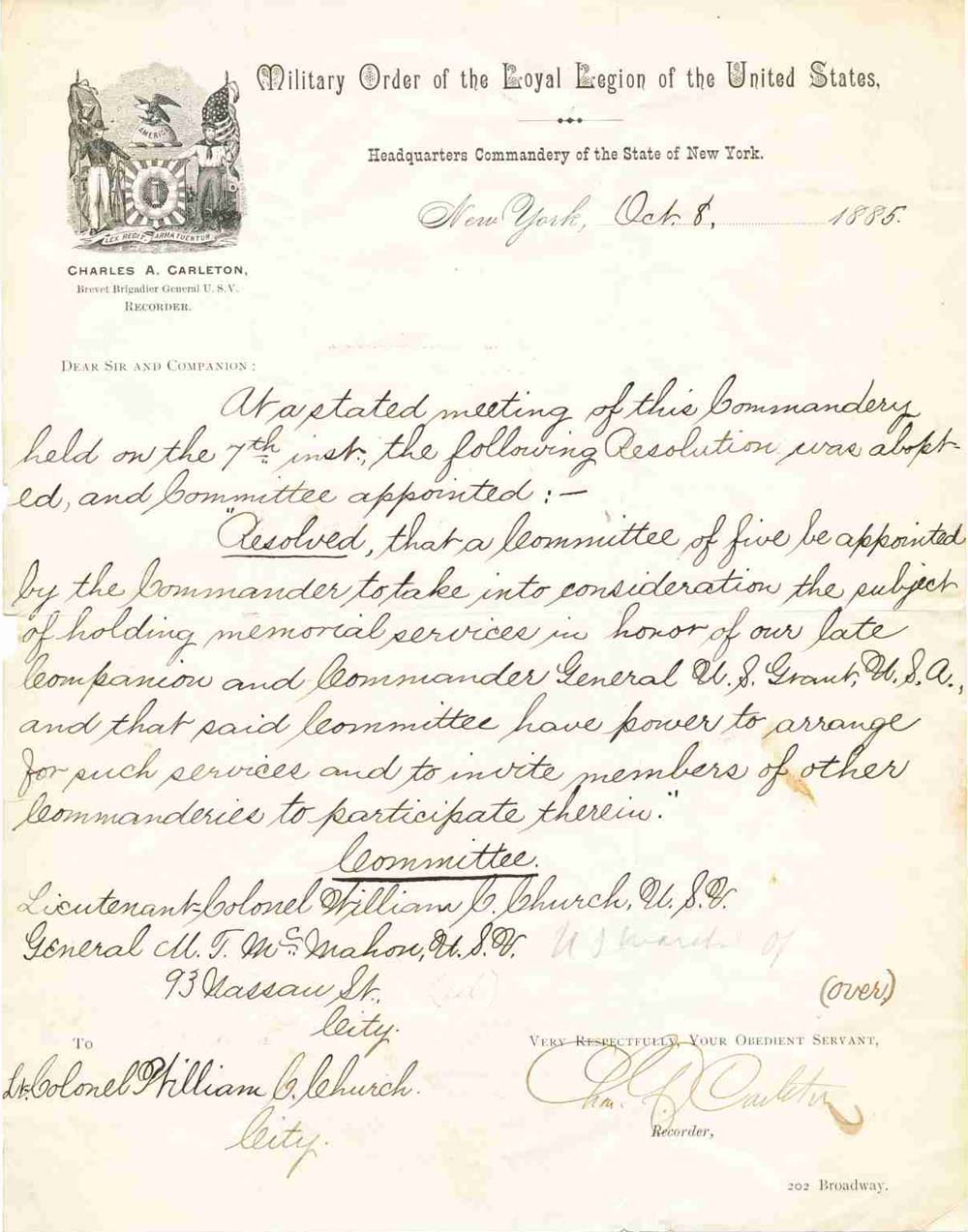
|
|
| |
| |
 WILLIAM HENRY HARRISON WILLIAM HENRY HARRISON |
|
|
|
|
| |
Price: $3,000.00 |
Stock# 5698 |
| |
DAYS BEFORE THE SIGNING OF THE TREATY OF GREENVILLE, FUTURE PRESIDENT WILLIAM HENRY HARRISON AUTHORIZES RATIONS SENT TO THE POTAWATOMI
WILLIAM HENRY HARRISON (1773-1841). Harrison was the nineth and shortest-serving President. He held office for only a month.
(POTAWATOMI NATION). A Native-American nation from the Great Lakes area, especially Michigan and Wisconsin, the Potawatomi belonged to the Northwestern Confederacy. This was an association of nations that formed after the American Revolution to protect their interests against those of the new United States. The Confederacy battled U.S. forces in the Northwest Indian War of 1786-95, which ended in defeat for its native participants. The Treaty of Greenville ended the war and forced the Confederacy to accept American governmental rulership and the loss of lands. The Potawatomi were involved in the fur trade and other trading.
ADS. 1pg. [Fort] Greenville, [Ohio]. July 25, 1795. An autograph document signed “Wm. H. Harrison” as aide-de-camp to Major General Anthony Wayne. It reads “The commissary will issue for the Putawatimies [sic] forty five pounds of flour & beef. Wm H Harrison”. This brief military document was written just a few days before the Treaty of Greenville, named for this same Ohio fort, formally ended the Northwestern Confederacy. Harrison had served in the war’s final battle and would sign the treaty as Wayne’s witness. It is in very good condition with a small hole. |
5698
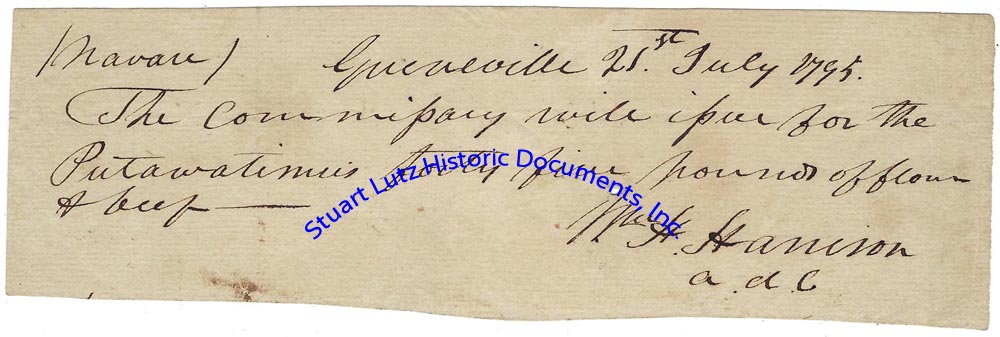
|
|
| |
| |
 RUTHERFORD HAYES RUTHERFORD HAYES |
|
|
|
|
| |
Price: $1,250.00 |
Stock# 3699 |
| |
PRESIDENT HAYES SIGNS A VERY LARGE PHOTOGRAPH OF HIS WIFE
RUTHERFORD B. HAYES (1822-1893). Hayes was the Nineteenth President and a Union general during the Civil War. During his Presidency, he ended Reconstruction, began civil service reform, and restored financial confidence after the Panic of 1873.
PS. 7 ½” x 13”. No date [circa 1877]. No place [likely Washington, DC]. A very large photograph of First Lady Lucy Hayes inscribed on the lower margin by the President, “To Miss Alberta Manning Houghton, with kindest regards, Rutherford B. Hayes”. The photograph has an 1877 imprinted date and a Sarony imprint; based on the 1877 date, it was probably signed as President. Houghton was, like Lucy Hayes, likely involved in the women’s suffrage and temperance movements. Hayes signed with his full name (not his usual “R.B. Hayes”) and the purple ink is light but legible. The overall condition is fine. |
3699
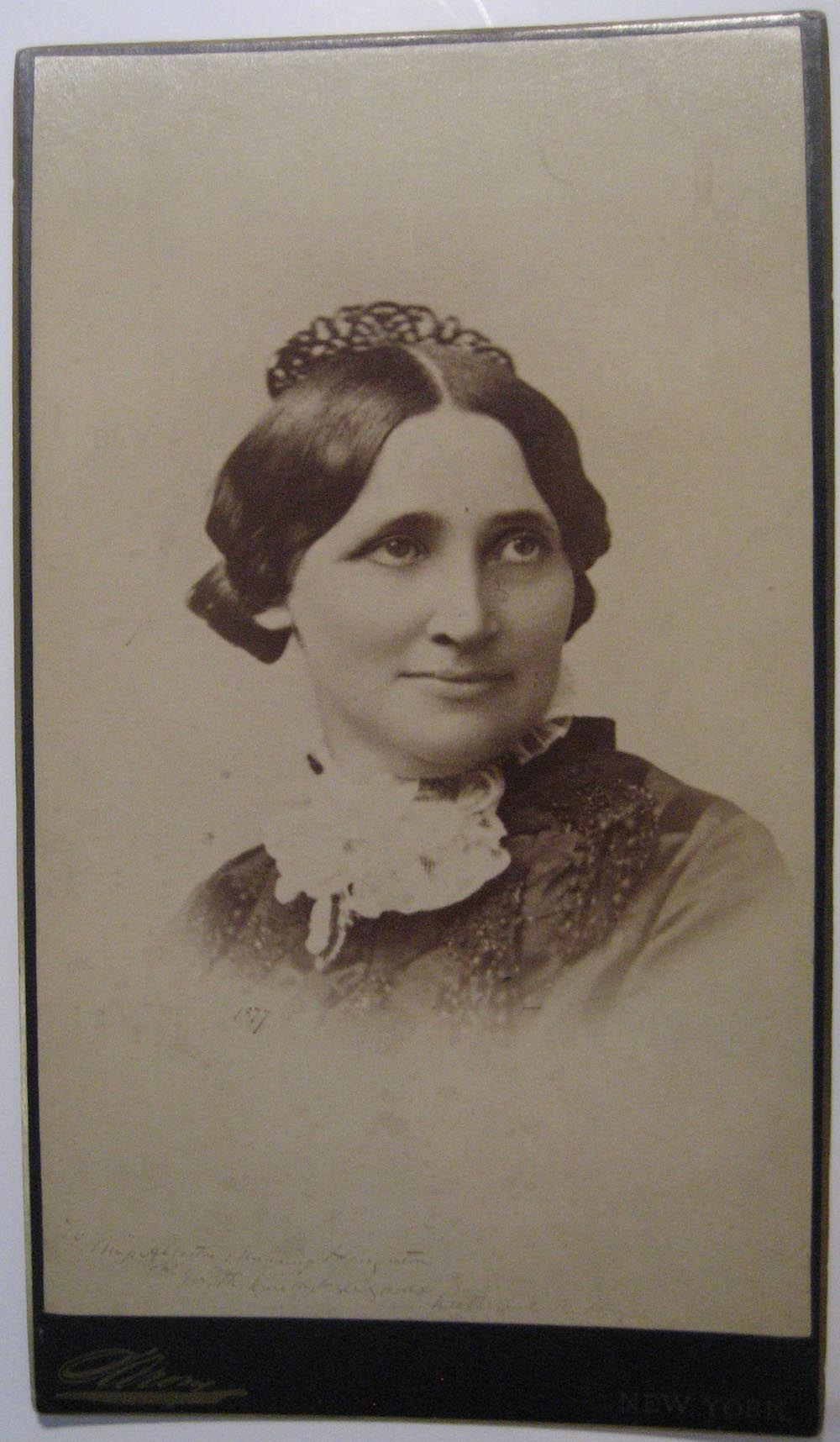
|
|
| |
| |
 RUTHERFORD B. HAYES RUTHERFORD B. HAYES |
|
|
|
|
| |
Price: $850.00 |
Stock# 4901 |
| |
RUTHERFORD B. HAYES SIGNS A CABINET CARD OF HIS WIFE, LUCY WEBB HAYES
RUTHERFORD B. HAYES (1822-1893). Hayes was the Nineteenth President.
PS. 4 ¼” x 6 ½”. N.d. N.p. A cabinet card signed “R. B. Hayes”. The cabinet card depicts Hayes’s wife, Lucy Webb Hayes. Hayes signed the bottom left corner of this slightly faded image taken by Sarony. It is in fine condition. |
4901
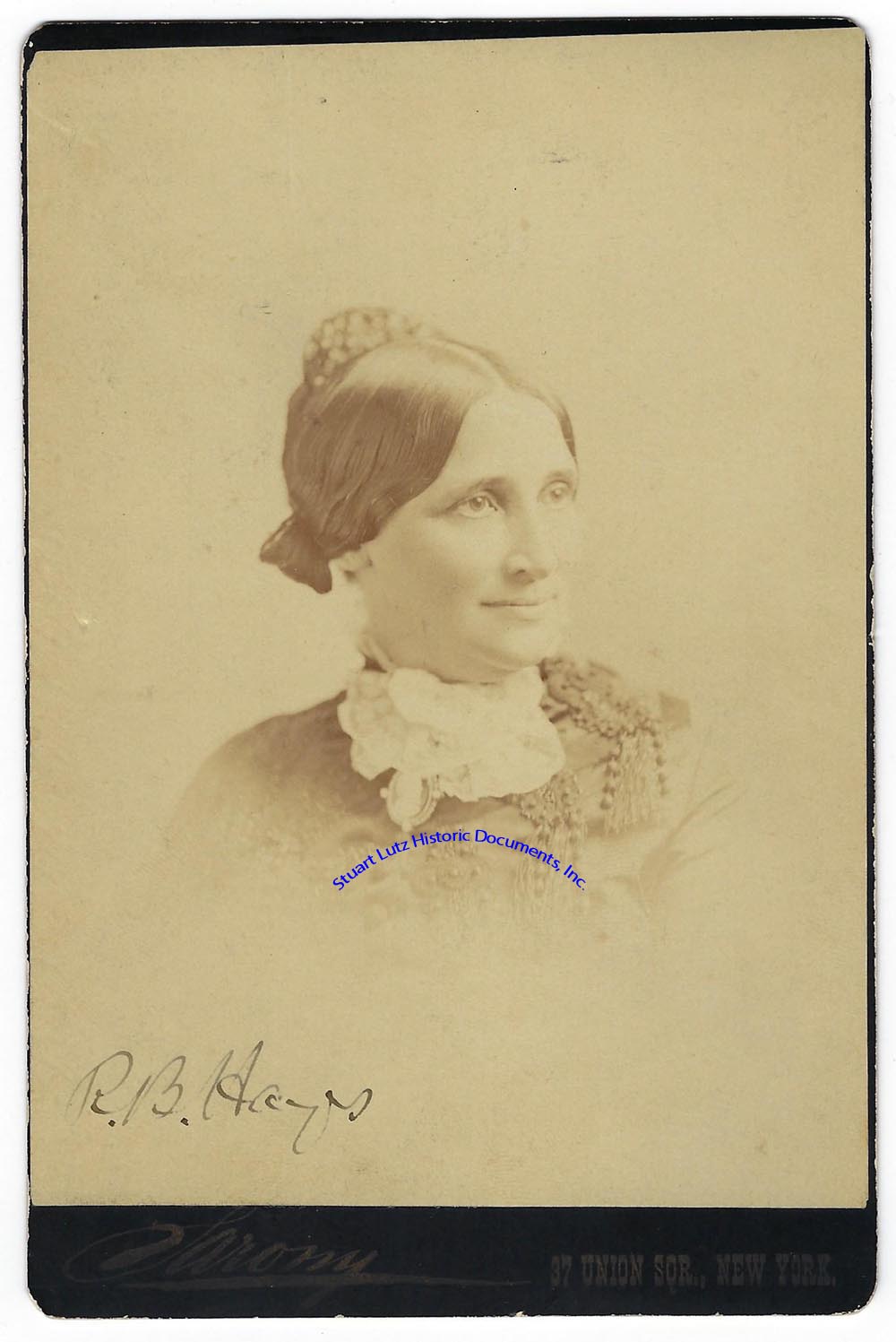
|
|
| |
| |
<Previous 6> <Next 6>
|
 |
